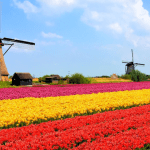Living and Working in the Netherlands
Interested in a smooth transition to the Netherlands? Keep reading our blog to uncover valuable insights and tips for your future adventure!
The Netherlands, also referred to as Holland, is a nation with a rich history, a thriving economy, and a unique way of life. In recent years, it has become a popular destination for expatriates seeking new opportunities and experiences. Read more about the benefits of setting up a business in the Netherlands.
The Netherlands is home to a highly educated and multilingual workforce, making it an attractive destination for international businesses. With a significant focus on R&D, the Netherlands consistently ranks highly in global innovation indices. This innovation-driven environment creates a fertile ground for entrepreneurs and professionals in sectors like technology, healthcare, and sustainable energy, making it an ideal place for career growth and advancement.
If you’re also one of the people who are considering living and working in the Netherlands, keep reading to find the comprehensive guide that will help you understand the Dutch way of life and how to make the most of your time in this picturesque European nation.
The Netherlands at a Glance
With its flat landscapes, picturesque canals, and vibrant cities, the Netherlands is a country that seamlessly blends tradition and modernity. It is well renowned for having bike-friendly streets, iconic windmills, and a strong focus on sustainability.
Geography and Economy
It ranks among the world’s top 20 economies and has a precise focus on manufacturing, and agriculture. Its capital city, Amsterdam, is not only a political center but also a significant financial hub in Europe.
Culture and Language
Although Dutch is the official language of the Netherlands, the majority of the population speaks English fluently. Dutch culture is known for its straightforwardness and tolerance, so remember to greet with a firm handshake and maintain eye contact during conversations.
Working in the Netherlands
Before you make the big move, you must secure a job there on top priority. The Dutch job market is known for its demand for skilled professionals, especially in fields like IT, engineering, and healthcare.
Job Search:
To begin your job search, start exploring and researching on online platforms like LinkedIn, Monsterboard, and Indeed. Filter out the job location for the Netherlands. Networking is also crucial, so consider attending industry events and local meetups.
Work Permits and Visas:
If you’re from outside the EU or EEA, you’ll typically need a work permit to work in the Netherlands; your employer can help you with the application process of getting one. Additionally, you can apply for a residence permit through the IND (Immigration and Naturalization Service).
CV and Interview Tips:
The Dutch-style CVs are usually concise and include a professional photo, so it’s better to tailor your CV according to their requirements before you start applying for jobs there. Once shortlisted, be prepared for competency-based interviews, where you’ll be asked to provide specific examples of your skills and experiences.
Housing and Cost of Living
The prospect of finding a place in the Netherlands is both exciting and challenging. The country offers various housing options, from apartments in bustling cities to traditional houses in quieter towns.
Housing Options:
While major cities like Amsterdam, Rotterdam, and Utrecht are popular among expats, each has its unique charm, so explore your options based on your preferences. Rental properties are widely available but be prepared for high demand in popular areas.
Cost of Living:
The cost of living in the Netherlands can vary significantly depending on your location and lifestyle. On average, you can expect to spend around €800 to €1,200 per month on rent for a one-bedroom apartment. Groceries, transportation, and healthcare costs are also relatively high.
Budgeting Tips:
To manage your expenses, you might need to create a detailed budget with all your daily expenses. If you don’t know how to cook, then right now may be the time to pick up a recipe book or two and hone your skills, as cooking at home in the Netherlands as opposed to eating out can save you a lot of money. Additionally, investing in a bicycle can help you save on transportation costs.
Healthcare and Education
One of the key factors to consider when relocating to the Netherlands is access to healthcare and education, especially if you have a family.
Healthcare System:
The Dutch healthcare system is known for its high quality and accessibility. However, to access all these healthcare services, you’ll need to have health insurance, known as “zorgverzekering.” There are a variety of insurance providers and you can choose from any, based on your preferences.
Education Options:
If you have children or are planning to study in the Netherlands, you’ll find a wide range of educational opportunities. International schools offer English-language instruction, and Dutch universities are renowned for their academic excellence, so you can rest assured knowing your education is in good hands.
However, these international schools can be a bit more expensive, with annual tuition fees ranging from €10,000 to €25,000. Public education is more affordable, but it’s typically taught in Dutch. University tuition fees for non-EU/EEA students can vary widely, so it’s better to research scholarship options.
Cultural Adaptation
In order to have a successful and satisfied expat experience in the Netherlands, adapting to the Dutch culture is essential. The Dutch are known around the world for their direct communication style and egalitarian society.
Social Norms:
The Dutch appreciate punctuality, so make sure to arrive on time for appointments and meetings. Additionally, it’s customary to remove your shoes when entering someone’s home. To avoid being unintentionally disrespectful, or coming off as insensitive, you should study all these social norms before the move.
Learning Dutch:
While many Dutch people speak English, making an effort to learn the Dutch language can enhance your experience and leave a great impression on the locals. There are various language schools and online resources available to help you get started.
Culture Shock:
It’s natural to experience culture shock when moving to a new country. To overcome this, engage in local activities, connect with expat communities, and take the time to explore your new surroundings.
Dutch Traditions:
Embrace Dutch traditions like King’s Day (Koningsdag) and Sinterklaas, which are celebrated with enthusiasm across the country. These events provide an excellent opportunity to connect with locals and immerse yourself in Dutch culture.
Work-Life Balance
You’d be happy to hear that work-life balance is highly valued in the Netherlands. Dutch employees often enjoy a healthy mix of work and personal life.
Work Hours:
A typical Dutch workweek consists of 36-40 hours, with a strong emphasis on productivity during office hours. Overtime is generally discouraged, as the Dutch prioritize efficiency.
Vacation and Holidays:
The Netherlands is generous when it comes to vacation days. Most employees are entitled to at least four weeks of paid leave per year, in addition to public holidays.
Childcare and Family Support:
The Dutch government provides different family support initiatives and grants. The availability of childcare services makes it simpler for parents to pursue careers while raising children.
Stress Management:
While the work environment is generally relaxed, it’s essential to manage stress effectively. Engaging in outdoor activities, such as cycling or enjoying nature reserves, can be a great way to unwind.
Legal and Administrative Aspects
For a seamless move, it is essential that you understand the legal and administrative requirements of living in the Netherlands.
Registering with the Municipality:
Upon arrival, you’ll need to register with your local municipality (gemeente). This process is essential for obtaining a BSN (Burgerservicenummer), a unique citizen service number necessary for various administrative tasks.
Taxes and Financial Regulations:
You need to familiarize yourself with Dutch tax regulations if you are planning to move and work there. The Netherlands has a progressive tax system, and it’s important to understand your tax obligations as an expat. You can also consult with a tax advisor to ensure compliance and make the process easier for you.
Residency Permits:
If you’re an EU/EEA citizen, you have the right to reside and work in the Netherlands without a specific permit. For non-EU/EEA citizens, securing a residence permit is essential for long-term stays.
Legal Rights and Responsibilities:
As a resident of the Netherlands, you have rights and responsibilities. Familiarize yourself with Dutch law, your lease agreement, and any employment contracts to ensure you understand your legal obligations.
Seeking Legal Assistance:
The Dutch legal system is renowned for its fairness when it comes to legal disputes or concerns. If you need help, you can contact legal aid organizations or attorneys.
Leisure and Exploration
Living in the Netherlands offers a wealth of opportunities for leisure and exploration.
Tourist Attractions:
From the historic canals of Amsterdam to the tulip fields of Keukenhof, the Netherlands boasts numerous attractions. Once you reach the country and are out on exploration, don’t miss the opportunity to visit the Anne Frank House, Rijksmuseum, and Van Gogh Museum.
Outdoor Activities:
The Dutch love the outdoors, so you’ll find many chances to go out and explore the extensive network of cycling routes, sail on the Frisian Lakes, or take a stroll through one of the many parks and forests.
Dutch Cuisine:
There are many Dutch dishes like “stroopwafels” (syrup waffles), “bitterballen” (deep-fried meatballs), and “haring” (raw herring) that are worth trying and will you turn into a fan of the cuisine. Dutch cuisine reflects the country’s maritime history and influences from around the world.
Entertainment and Nightlife:
After nightfall, Dutch cities come to life with entertainment and colorful nightlife. This time at night is the best to enjoy live music, theater, and a vibrant club scene in Amsterdam, Rotterdam, and Utrecht.
Travel Opportunities:
The Netherlands’ central location in Europe makes it an excellent base for exploring neighboring countries. There are high-speed trains and affordable flights available at your disposal to connect you to cities like Paris, Berlin, and Brussels.













